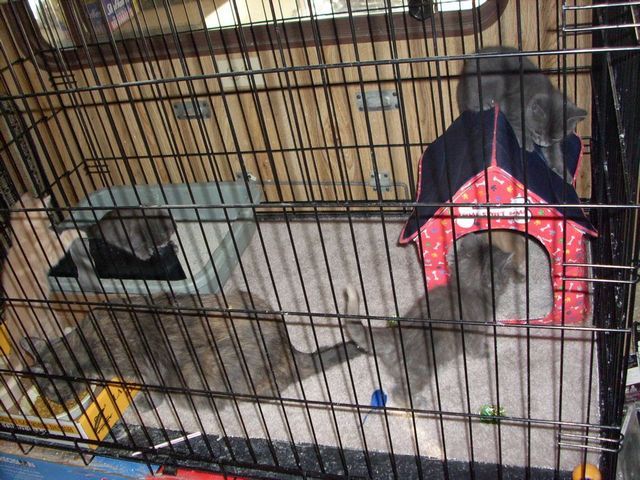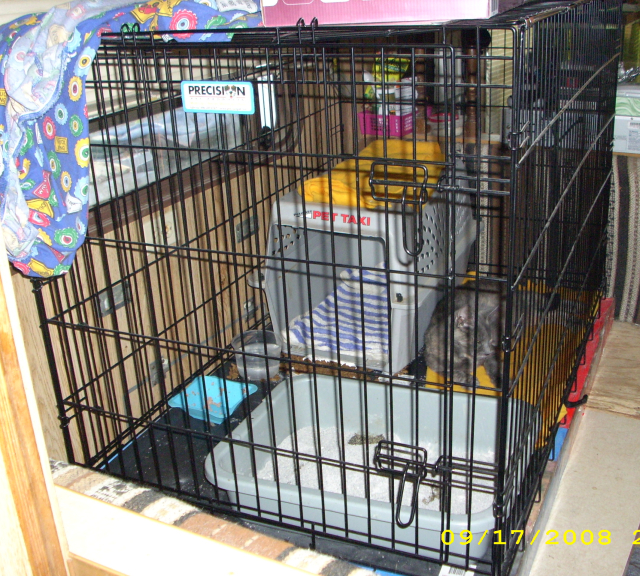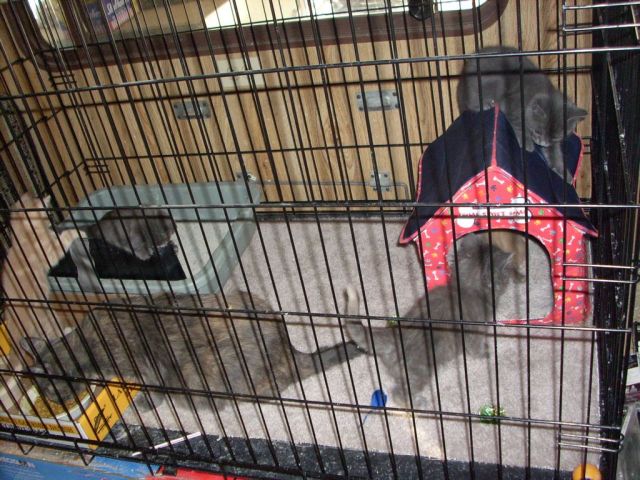QuestionDear Tabbi
I have recently adopted two 10 month cats - a brother and sister. They spent the first four months of their lives in a home and the following six in a cattery surrounded by lots of other lovely cats.
The lady who owns the cattery said that the more outgoing male would encourage his sister to be less timid and make friends with me, but as the weeks go by the opposite is happening. I think that they are turning to each other for comfort so they have no need to socialise with me. They hide for hours and only come out to play at night when I am in bed. If I move or get up from a chair they seem petrified and find even more obscure places to hide. If the female thinks I am invading her personal territory which I do my best not to, she hisses. The male doesn't like being stroked although he doesn't object, but he makes sure that he hides for hours afterward. As time passes he just seems to be growing more wary of me and I don't know what to do. I am better to give up the more timid female and focus on the brother before he becomes completely antagonistic to me.
I am currently feeding them in the living room as I thought it would make them more sociable. The boy will come in, eat and disappear but the female takes all day to get her courage together and has a couple of bites to eat in the evening. I have been advised only to feed on demand now. What do you think?
AnswerAntoinette,
The first thing I would do is speak to the lady you got them from. Tell her they are not working out and see if you can exchange them.
It sounds like they may have have feral parents and in that case their personalities may not change. They are inbred to distrust humans and it takes a LONG time, especially the older they get, to get them to trust you. They take a lot of work because they are not like domesticated house cats and won't behave like one.
Feral cats can be loving but they DO NOT like to be petted or held. When you can pet them, do it only briefly. They do not like it for very long. Watch their tails and ears. If their tails wag or ears go back stop NOW.
They are quick to swat at you also until they completely are trusting of you. Do not come at them with your hand from the front to pet them, that can get you swatted. They swat first and think after. It's the self-preservation in them. Always pet from behind the head. Shoulder blades are a favorite pet spot for them. Do not stare at them directly in the eye, that is a threatening gesture. You can look them in the eye only if you slowly blink your eyes at them, or look away. That is a sign of being a friend and not foe...a friendly gesture.
You need to be careful about the tone of your voice with them. NEVER yell at them...and NEVER hit them. They are VERY sensitive and it is VERY easy to undo any progress you have made. When that happens it is VERY difficult to gain their trust again if you lose it. Their trust of humans is fragile. Training them is easier though because of the voice control. They immediately know what you don't like and won't accept by the tone of your voice.
Food is the key to taming. It also associates you with something pleasant. Treats like tuna, tinned sardines with oil, pieces of raw beef, etc. are favorites. Especially something they can easily grab and run with if necessary. The kittens may hesitate to eat in your presence at first, but be patient. Put their food out then sit back quietly, speaking gently to them. Keep moving the food closer to you over a period of time until the food is right next to you and they trust you enough to eat it.
Then you can start touching. Be careful of making sudden moves....remember they are very skittish. How soon you begin handling the kitten depends on the kitten. The more often kittens are handled, the more likely they are to be socialized. Feral kittens will hiss, growl, and swat. Do not be deterred. Also the kittens can have different fathers (even from the same litter) so they may not all act or behave the same.
Healthy ferals kittens are playful. They are also hunters and enjoy being able to do it. They will instinctively chase a string. Giving them a raw beef rib bone periodically as a treat (I have the butcher cut them in half) satisfies the "fresh kill' instinct, plus the fibers help clean their teeth. You should give them things to 'hunt' as they get older...like stuffed toy mice, little crafts balls that you can throw (ALL my feral kittens 'retrieve' when I throw them), or a pet laser light (from Petco, PetSmart, etc.) so they can chase the little red 'bug' on the ground. It is funny to watch them, it is a great interactive toy between you and the kittens because you can play with them without physical contact which will help them develop trust, and it helps you bond with them.
I hope this gives you some insight on how to work with feral kittens. The more time you are around them the better. Some ferals don't ever trust humans and can not be tamed, but you have their age in your favor when they are young. Ferals take a lot of time, patience, and love to overcome their natural fear of humans...but the end result is heartwarming. Just take your time with them.
A lot of people don't agree, but there are so very many cats and kittens being put down due to over crowding in shelters that are sweet and loving, would love a chance to have a home and enough food to eat, and attention, that you don't need to feel that you have to keep your cats if you don't feel comfortable or you are not happy with them.
I hope this helps.
Tabbi

 Trying to blend families
QuestionQUESTION: Me and my 4 1/2 year old male cat rec
Trying to blend families
QuestionQUESTION: Me and my 4 1/2 year old male cat rec
 tabby aggressive
QuestionHi,my male cat jasper is 7 years of age and has
tabby aggressive
QuestionHi,my male cat jasper is 7 years of age and has
 Cat cries when I am on computer
QuestionQUESTION: I have 3 devon rex; 2 male and 1 fema
Cat cries when I am on computer
QuestionQUESTION: I have 3 devon rex; 2 male and 1 fema
 Kitten trying to run outside
QuestionI adopted a 3 month old male tabby a few days a
Kitten trying to run outside
QuestionI adopted a 3 month old male tabby a few days a
 I dont understand my cat!
QuestionOliver
QUESTION: In January 2009 I got a
I dont understand my cat!
QuestionOliver
QUESTION: In January 2009 I got a